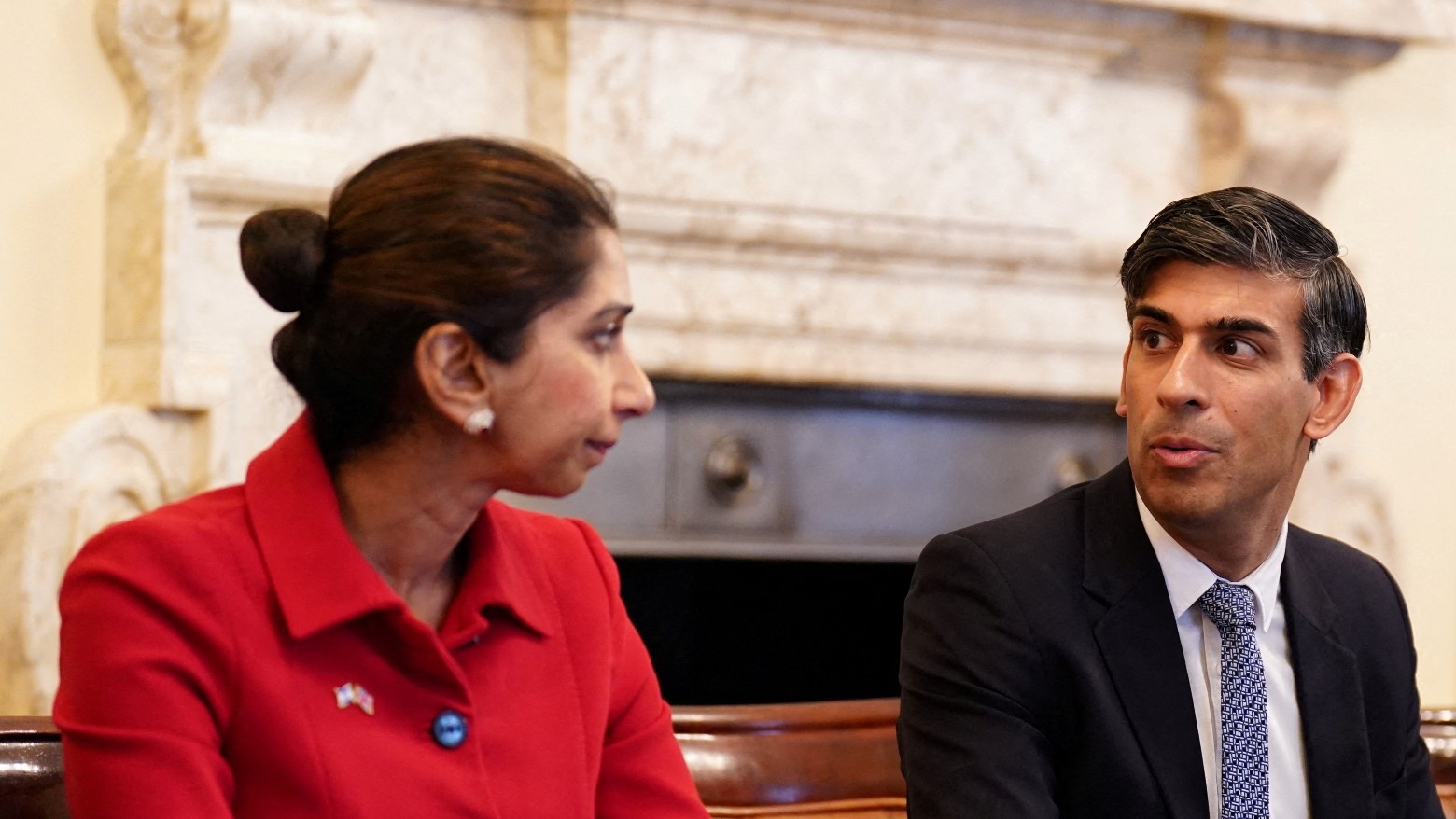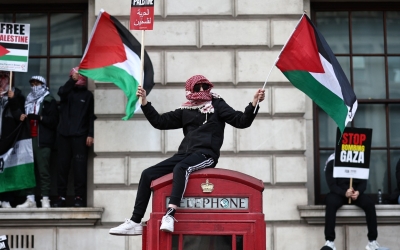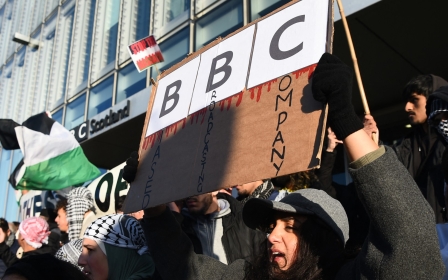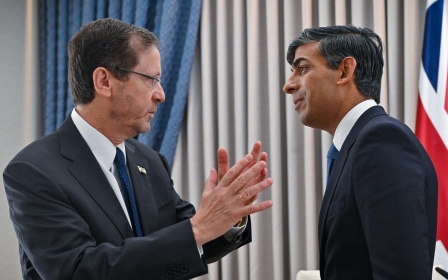Israel-Palestine war: Sunak and his ministers are the true extremists

This weekend, we learnt that, in the wake of Israel's war on Gaza, British Prime Minister Rishi Sunak’s government intends to broaden the definition of extremism to include anyone who "undermines" British institutions and values.
The government is contemplating a new "cohesion and counter-extremism plan" which will "frame a new, unified response to extremism".
The document, which is being prepared by Michael Gove’s Department of Levelling Up, Housing and Communities, defines extremism as "the promotion or advancement of any ideology which aims to overturn or undermine the UK’s system of parliamentary democracy, its institutions and values".
The Muslim Council of Britain, Muslim Engagement and Development (Mend) and Palestine Action are among the organisations targeted on the basis that they would be "captured" by the new definition of extremism.
There is a terrible irony here.
By this definition, the Sunak government itself should be designated. It is the most extremist government in modern British history. No government has ever waged war on British institutions with the sinister determination of the Tories.
There is no British institution and no British value which the consecutive Tory governments have not undermined and attacked. These institutions include the National Health Service, the rule of law, the monarchy, the BBC and the civil service.
All this is well documented.
Follow Middle East Eye's live coverage for the latest on the Israel-Palestine war
To quote the distinguished academic Andrew Corbett of the University of London, the government "has threatened parliamentary sovereignty, the independence of the judiciary, the independence of the BBC, the individual right to trial by jury and has undermined public confidence in all institutions of governance to an extent never seen before."
The situation is so serious that Dr Corbett added: "The net effect of all these measures could amount to a coup – a very British coup, one which will perhaps only be evident in hindsight." Corbett wrote these words when Boris Johnson was still prime minister, but matters have only gotten worse under the Sunak government.
The academic could have added the monarchy, the most ancient British institution of all, to his list.
Astonishing double standards
Last year, Sunak forbade King Charles from attending COP 27 in Cairo to give a speech about climate change.
Earlier, Sunak served as a senior member of the Boris Johnson cabinet when Johnson was accused of lying to the queen about the decision to prorogue the British parliament in 2019. Johnson rejected the accusation.
Gove - architect of the new counter-extremism proposal - broke his sacred Privy Council oath by apparently leaking a private conversation with the late monarch to Rupert Murdoch’s Sun newspaper.
Gove, nevertheless, has the audacity to oversee official proposals designed to designate law-abiding Muslim organisations such as the Muslim Council of Britain as "extremist".
The double standard is astonishing.
The attack on British values and institutions has accelerated since Sunak became prime minister. Repeatedly, Sunak has assaulted Britain’s most sacred tradition - the rule of law - with dog-whistle attacks on so-called "activist" lawyers.
Leading the way has been the home secretary, Suella Braverman. Braverman is, I think, Britain’s most bigoted (and extremist) mainstream politician since Enoch Powell.
Sunak’s predecessor as Tory prime minister, Sir Edward Heath, sacked Powell for making notoriously racist remarks against immigrants. Sunak retains Braverman, who is reportedly described by a former minister in the Johnson government as a "real racist bigot".
There’s no shortage of evidence to support that damning remark. The home secretary falsely claimed that so-called "grooming gangs" were almost entirely made up of British Pakistani men, whom she said "hold cultural attitudes completely incompatible with British values".
She has talked of an "invasion" of migrants. Now she wants to legislate to stop homeless people sleeping in tents. This is a basic attack not just on the most vulnerable members of our society, but a betrayal of British values.
To use the kind of language favoured by the Tories themselves, the Sunak government hates Britain, British values and everything we stand for.
'Hate marches'
This brings me to the language used by Braverman about the regular demonstrations across Britain calling for a ceasefire in Gaza. My wife and daughters have been on these marches. If I was in London rather than here in the West Bank reporting settler violence, I would have been with them.
To Braverman these are "hate marches".
The Sunak government’s use of the term ‘hate march’ displays a failure to understand that the right to protest is a fundamental British value
In my view, those who march against the murderous assault on Gaza represent a longstanding British tradition as reflected in the Stop the War march against the Iraq War in 2003, the Ban the Bomb marches of the 1960s, the Jarrow crusade against poverty and unemployment in 1936 and the Suffragettes and their campaign for equality before World War One (they too were labelled "extremist").
It is possible to honourably disagree with all these great causes. But the Sunak government’s use of the term "hate march" displays a failure to understand that the right to protest is a fundamental British value.
Meanwhile, not one government minister, as far as I can see, has condemned the indiscriminate slaughter of civilians in Gaza, or uttered a word of condemnation of the wave of settler attacks including displacement of Palestinian communities - war crimes - across the West Bank. Nor the genocidal language used by too many Israeli leaders.
In fairness to Sunak and his minister, the term "extremist" is subjective - the reason why the Tory attempt to incorporate the term into British law has failed.
But, I believe that the great majority of ordinary decent people are coming to see that Sunak and his out-of-control ministers are the true extremists.
The views expressed in this article belong to the author and do not necessarily reflect the editorial policy of Middle East Eye.
Middle East Eye propose une couverture et une analyse indépendantes et incomparables du Moyen-Orient, de l’Afrique du Nord et d’autres régions du monde. Pour en savoir plus sur la reprise de ce contenu et les frais qui s’appliquent, veuillez remplir ce formulaire [en anglais]. Pour en savoir plus sur MEE, cliquez ici [en anglais].






